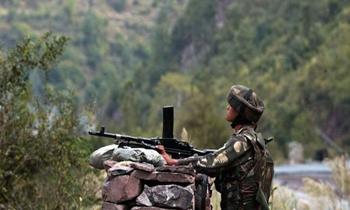New Delhi, Oct 9: Even as India resorted to massive firepower to silence Pakistani guns from across the border, Prime Minister Narendra Modi said everything will be all right soon.

The directors general of military operations (DGMOs) from India and Pakistan spoke via the hotline on Tuesday about the need to de-escalate the situation. The scenario near the International Border (IB) in Jammu, however, remained unchanged.
As firing continued from the Pakistani side, officials said there will be no flag meeting till shelling stops from across the border. The troops have been asked to respond to Pakistani firing and continue with the no-talk stand.
“No talks, continue firing. This is the message we have given to them (Border Security Force) also,” a senior Home Ministry official said.
Sources said the Pakistani Army, Rangers and the Lashkar-e-Toiba were firing shoulder-to-shoulder in a coordinated, systematic and well-planned manner. At least two civilians and 20 others were injured on the Indian side in the last 24 hours. So far, seven people have been killed and close to 60 injured in the shelling.
Border Security Force (BSF) sources said Pakistan Rangers targeted 54 border outposts across Jammu. Cross-border firing continued at all BSF sectors in the area, including Akhnoor, RS Pura, Kanachak and Arnia.
Three personnel suffered injuries and one of them was airlifted to Delhi.
“The government is taking it seriously and we want a quick resolution. We want peace and tranquillity. The government is taking a number of steps, diplomatically and otherwise,” said Raha, who is also the chairman of the Chief of Staff Committee.
Earlier in the day, Army Chief Gen Dalbir Singh Suhag said the Army had given an effective and immediate response to Pakistani shelling. Several Pakistani structures were destroyed though there is no official confirmation on their numbers.
The prime minister was seen having a one-on-one with Gen Suhag at the At Home function before he made the statement.
Throughout the day, Modi was under attack from Congress vice-president Rahul Gandhi who asked why the prime minister was silent on the issue of ceasefire violations by Pakistan. About 20,000 people from 30 odd border villages have been shifted to safer locations.
Army officials, however, claimed that there was no firing across the 740 km long Line of Control (LoC) in Kashmir since Tuesday night.
Before the lull, there were seven incidents of firing at Poonch, Mendhar, Krishna Ghati and Bimbergali sectors on the LoC.
National Security Advisor Ajit Doval, who has been tasked by the prime minister to defuse the crisis, reviewed the situation along with Home Secretary Anil Goswami.
The ground zero has flared up considerably since October 3 when shelling from the Pakistan side began. The firing on border villages took place though the two DGMOs decided in August to spare civilians.
Pakistan claimed it began the fresh round of firing after 9 civilians were killed and 25 injured in Sialkot by unprovoked Indian firing.





Comments
Add new comment